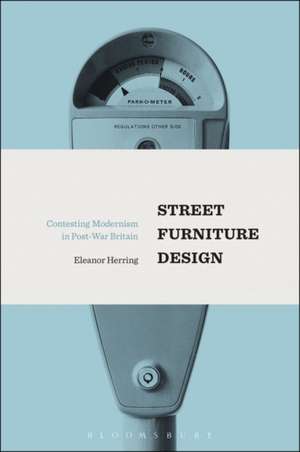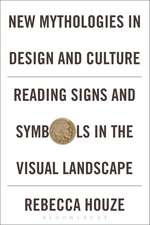Street Furniture Design: Contesting Modernism in Post-War Britain
Autor Eleanor Herringen Limba Engleză Hardback – 13 iul 2016
| Toate formatele și edițiile | Preț | Express |
|---|---|---|
| Paperback (1) | 198.57 lei 6-8 săpt. | |
| Bloomsbury Publishing – 27 dec 2017 | 198.57 lei 6-8 săpt. | |
| Hardback (1) | 537.37 lei 3-5 săpt. | +21.69 lei 4-10 zile |
| Bloomsbury Publishing – 13 iul 2016 | 537.37 lei 3-5 săpt. | +21.69 lei 4-10 zile |
Preț: 537.37 lei
Preț vechi: 697.88 lei
-23% Nou
Puncte Express: 806
Preț estimativ în valută:
102.86€ • 111.76$ • 86.46£
102.86€ • 111.76$ • 86.46£
Carte disponibilă
Livrare economică 31 martie-14 aprilie
Livrare express 14-20 martie pentru 31.68 lei
Preluare comenzi: 021 569.72.76
Specificații
ISBN-13: 9781474245616
ISBN-10: 1474245617
Pagini: 224
Ilustrații: 60 bw illus
Dimensiuni: 156 x 234 x 15 mm
Greutate: 0.52 kg
Editura: Bloomsbury Publishing
Colecția Bloomsbury Academic
Locul publicării:London, United Kingdom
ISBN-10: 1474245617
Pagini: 224
Ilustrații: 60 bw illus
Dimensiuni: 156 x 234 x 15 mm
Greutate: 0.52 kg
Editura: Bloomsbury Publishing
Colecția Bloomsbury Academic
Locul publicării:London, United Kingdom
Caracteristici
Taps into current interest and debate about the design of our shared living places and spaces and the role of national and local government in delivering 'good' design
Notă biografică
Eleanor Herring lectures in design history at the Glasgow School of Art, Scotland. She has published articles in various edited volumes and conference proceedings.
Cuprins
Introduction1. Precedents and Beginnings: 1814 - 19442. The Council of Industrial Design: Official Articulations of Street Furniture Design3. The Great and the Good: Power and Influence4. Municipal Vandalism: Tyranny, Confrontation and Resistance5. Beyond Good Design: A Period of Transformation 1960 - 1974ConclusionEpilogue
Recenzii
[Herring] has done an enormous amount of research to uncover the story of objects that most of us walk past without a second glance. ... [A] fascinating book.
The book includes a useful select bibliography, is appealingly designed and is generously illustrated ... Street Furniture Design: Contesting Modernism in Post-War Britain is an important account of an overlooked chapter in post-war design history, which also demonstrates that design histories can-and should-include multiple voices.
A fascinating and revealing analysis of the controversies and anxieties that surrounded the design of urban environments in post-war England. Using archival and other contemporary accounts, Herring demonstrates how the interplay between a wide array of different players and their contrasting agendas based on class, politics and power, formed and controlled the design of these public spaces.
Meticulously researched and beautifully written, Street Furniture Design delves into the debates about the aesthetics and ethics of British townscapes in the immediate postwar decades. Eleanor Herring has written a scintillating book about how the often unnoticed world of lampposts, benches and bus shelters gets fashioned. It's a great read.
Street Furniture Design sheds a clear light on how taste, class and power impact the relationship between public policy and design. Its thorough research presents compelling evidence about the politics of furnishing the street and the privatization of public space. Eleanor Herring has provided a deep and original insight into the way design meets society. You'll see the street differently now.
A brilliant and entertaining account of a neglected subject, well written, often comic but fundamentally serious history of an important battleground in the war for Good Modern Design in the 20th Century. This will surely become the standard work.
"Street furniture", once central to debates about good design and town planning, has here been treated properly by a meticulous scholar who understands the significance of the subject for design history as a whole. Concentrating on the post war period in Britain, Herring uses street furniture as a lens to elucidate some of the key debates about design and modern urban life. This is an excellent book.
The book includes a useful select bibliography, is appealingly designed and is generously illustrated ... Street Furniture Design: Contesting Modernism in Post-War Britain is an important account of an overlooked chapter in post-war design history, which also demonstrates that design histories can-and should-include multiple voices.
A fascinating and revealing analysis of the controversies and anxieties that surrounded the design of urban environments in post-war England. Using archival and other contemporary accounts, Herring demonstrates how the interplay between a wide array of different players and their contrasting agendas based on class, politics and power, formed and controlled the design of these public spaces.
Meticulously researched and beautifully written, Street Furniture Design delves into the debates about the aesthetics and ethics of British townscapes in the immediate postwar decades. Eleanor Herring has written a scintillating book about how the often unnoticed world of lampposts, benches and bus shelters gets fashioned. It's a great read.
Street Furniture Design sheds a clear light on how taste, class and power impact the relationship between public policy and design. Its thorough research presents compelling evidence about the politics of furnishing the street and the privatization of public space. Eleanor Herring has provided a deep and original insight into the way design meets society. You'll see the street differently now.
A brilliant and entertaining account of a neglected subject, well written, often comic but fundamentally serious history of an important battleground in the war for Good Modern Design in the 20th Century. This will surely become the standard work.
"Street furniture", once central to debates about good design and town planning, has here been treated properly by a meticulous scholar who understands the significance of the subject for design history as a whole. Concentrating on the post war period in Britain, Herring uses street furniture as a lens to elucidate some of the key debates about design and modern urban life. This is an excellent book.










